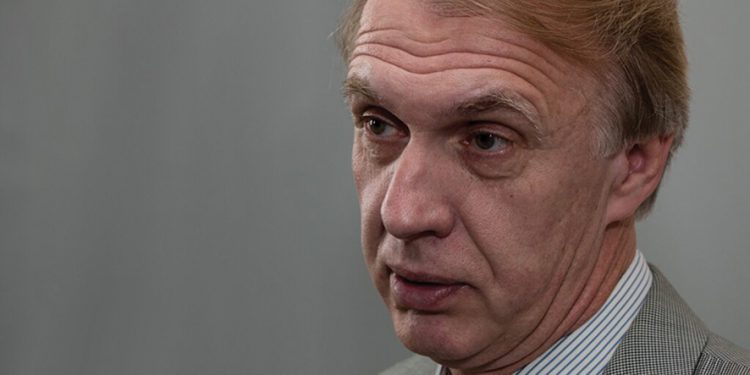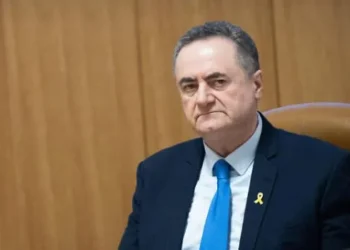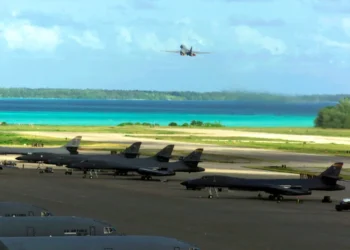This week marks the 15th anniversary of the NATO Bucharest Summit of 2008, in many ways a seminal moment for both Georgia and Ukraine, as their hopes to get the NATO Membership Action Plan (MAP) were dashed and they were given a vague membership promise instead – that, one day, they would get there. Radio Free Europe’s Georgian service spoke to Volodymyr Ohryzko, then Foreign Minister of Ukraine, who was right in the thick of it all back then, to share his recollections.
What’s the legacy of the 2008 Bucharest Summit?
The legacy is that the political will of some NATO member states wasn’t, unfortunately, on the side of Ukraine and Georgia. Why? Because at that time, our German and French friends were occupied by the idea that Russia could be transformed into a liberal, democratic state.
In my view, it was a strategic mistake made by both Germany and France, because we, Ukrainians, like the Georgians, very well understand what it means to be inside Russia, and to be Russia’s neighbor. It means being an object of aggression or a “younger brother” at best.
I remember arguing with some Western colleagues, saying they were making a huge mistake in not thinking ahead, not analyzing the situation and what was going on in Russia. And Russia and Putin did understand that, and took full advantage of it to do what they wanted. And soon after the summit, we saw Russia invade Georgia, in August of 2008.
The reaction of the Western world was shameful. Immediately after the invasion, I flew to Washington, to speak to then Secretary of State Condoleezza Rice, and I said, “Look, Ukraine will be next if there isn’t a policy rethink towards Russia.” I said “it’s not a theoretical threat, it’s a real, tangible threat!”
Unfortunately, her reaction was not as pragmatic as I hoped it would be. I proposed the American side sign a bilateral security agreement, like the United States have with close allies, South Korea and Japan, etc. The answer was not very promising. She told me: “Look, Vladimir, frankly speaking, it’s absolutely not possible that Russia will invade as big a country as Ukraine. Georgia is small, and we can imagine they were in no position to defend themselves. But Ukraine is practically impossible to invade and try to occupy.”
Their philosophy was far from the reality, from understanding what Russia meant to do, and this is what we are now paying for with our own blood.
Prior to the summit, were there any tangible hopes that Ukraine stood a reasonable chance of getting a MAP? And if so, what where those hopes based on?
January that year, I remember meeting then Secretary General of NATO, Jaap De Hoop Scheffer, and I brought him a letter signed by President Yushchenko, Prime Minister Timoshenko and Speaker of the Parliament, Yatsenyuk. I can’t say that he was very happy with this letter, because he said “Look, we have just three months for this? Okay, we will start our consultations. What is very important is the position of the United States.”
That’s why we organized many consultations on the various levels with the States. The last one was the visit of President Bush to Ukraine prior to the summit meeting. We heard voices from Berlin and Paris, but nevertheless hoped that the leading role of the US would be in support, because the US was and still is the motor of NATO. They told us that they would support us. And that is why our hope was, I will say, not groundless.
Any behind-the-scenes stories that you want to share that shed light on the decision-making?
What I remember I found remarkable is that Putin came in, and even at that time stated that “Ukraine is not a state, it’s a failed state, it is territory of Russia,” that we are the same nation as Russians. And he repeated this many times there, to various delegations. Some delegations thought him a little bit crazy.
But nevertheless, it didn’t change Madam Merkel and Mr. Sarkozy’s position. And due to their unwise approach, we weren’t given MAP. Had we been given it, I am convinced that the attack on Georgia wouldn’t have happened, the Crimea annexation wouldn’t have happened, Donbas and this full scale war that were are fighting today could have been avoided.
There’s a famous Sarkozy quote that it was the first time America didn’t get what it wanted from NATO. How big was the contribution of Chancellor Merkel and President Sarkozy themselves, as political leaders, in that?
The anti-Americanism in France and Germany was and still is very high, despite the fact the Americans freed Europe from the Nazis, and later Germany from Soviet rule. And let’s not forget that economic interests rule the game, and trading with Russia was something they were very fond of. Even now, after this huge invasion of Russia and Ukraine, many Western companies are still present in Russia, using this opportunity to get bigger profits than before. Sometimes economic interests are much higher than geopolitical ones, not saying anything about morality.
Our then president called the summit decision “better than MAP”, while yours said it was “now just a formality until Ukraine gets MAP in December.” What was that optimism borne of?
There was some optimism, and I can explain why. Because we got the so-called annual National Program, which in fact was some kind of MAP, the same criteria to fulfill, but not binding. Our Western colleagues told us at the time: “Let’s start with the rulebook. It’s not about the name of this plan, it’s about what to do, about the essence of what we are doing. So, let’s start doing practical things.”
This decision was very well taken in Moscow, as a sign that the West, first of all, was thinking about the position of Moscow, taking into account the wishes of Moscow; seeing we were pushed down to the second rate issues; where Russia matters, but all others, Ukraine, Georgia, don’t. We were begging them: “Please open your eyes and analyze not the ‘let’s be friends’ statements from Putin, but the mentality and history of the Russian population; please analyze the events that took place inside Russia, for example, in Chechnya – please do not forget the city of Grozny destroyed.”
Unfortunately, it fell on deaf ears. The example of Georgia was also a very pessimistic one, because three months after this Russian invasion, the West went back to business as usual.
In 2017, you said that the time will come when the roles are reversed and the West will be begging for Tbilisi and Kyiv to become NATO / EU members. And that Ukraine in 20 years will become a super state and the backbone of the new Europe. How far off is that today, given what’s happening?
I’m an optimist. I do understand that, even now, we have some politicians in Europe who are still hesitant, who are still thinking, “we’ll make a new attempt to democratize Russia, to make Russia liberal.” I remember in this sense a very simple example of Ukraine’s past, three months before Ukraine proclaimed its independence, when President Bush Senior came to Ukraine and said “Ukrainians please do not be so nationalistic.”
The “Chicken Kyiv” speech?
Exactly. “Be with Gorby, Gorby’s a good guy.” But, there are some objective reasons for the history, there are some objective rules. And that is why the Soviet Union disappeared so easily, so quickly, and became a thing of the past. In my view, the Russian Federation today is not merely walking, but running down this same path. It is very weak inside – the Russian economy, after the sanctions, will probably endure for a few years more. The Russian elites, the people around Putin, are weighing up their options: Do they want to stand with Putin in The Hague? The population inside Russia is also starting to open their eyes, and let’s not forget that Russia is not only made up of Russians; today there are many dozens of nationalities who have the right to self-determination. That is why I believe that the days of Russia are already numbered. I believe that very soon, especially after the very effective actions of Ukraine’s army, Putin’s regime will be over.
What will come next? My understanding is that it will likely be a smaller Russia, reduced to the historic Muscovy, surrounded by many other entities that today are part of Russia. Many politicians in the West are still thinking that somehow Russia will exist in the future. In my view, it is the wrong approach. That is why I hope that Ukraine, Georgia, Eastern European countries in the future will really form a new center of power inside the EU and inside NATO. And in this sense, our future is, I am pretty sure, very positive.
Interview by Vazha Tavberidze for RFE/RL














